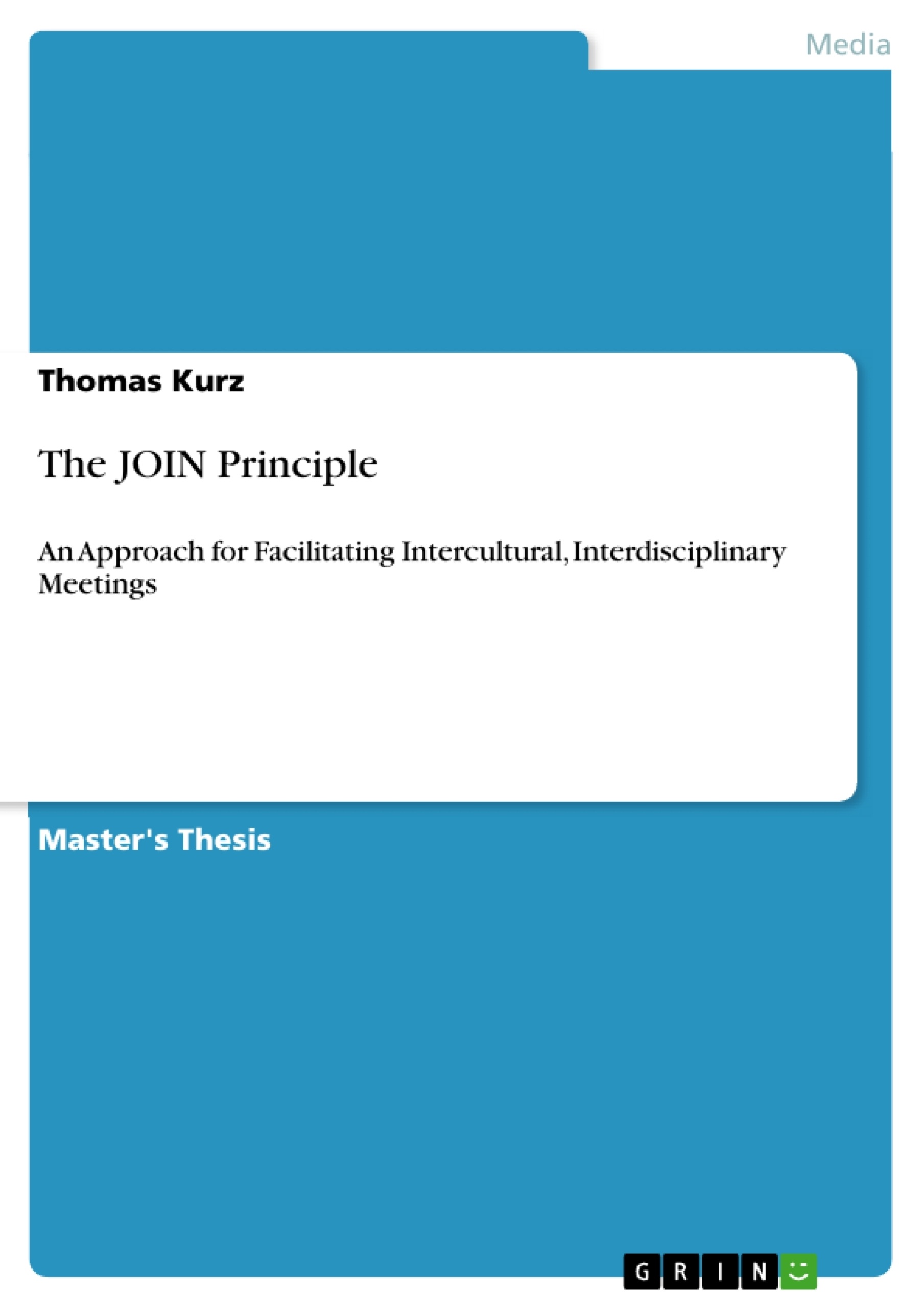This work describes the creation and first application of an approach for facilitating intercultural, interdisciplinary meetings. 'The JOIN Principle', or JOIN, for short is mainly based on the Theme-Centred Interaction (TCI) and Reteaming methodology. Highlights of this work are the extensive, integrated literature element on culture, communication, and organisational dynamics, as well as one of the few analyses of current literature on TCI in the English language. Additionally, the TCI group phase model by Angelika and Eike Rubner, including associated fears and wishes in each phase of the group development, are first published here in the English language. The description of JOIN is enriched with examples and guidelines on how to use this thesis as a handbook for the application of the principle. Finally, five intercultural, interdisciplinary workshops were conducted with JOIN and the data collected is analysed and documented in the work at hand. The conclusion and outlook chapter summarises the results, including personal quotations from the hiring executives of the workshops, and provides suggestions for future research.
Inhaltsverzeichnis (Table of Contents)
- Introduction
- Intercultural Communication
- Cultural Dynamics
- Definition and History
- Cultural Dimensions
- Diversity
- Usage of Culture in this thesis
- The Nature of intercultural Communication
- Culture and Communication
- Communication basics
- Nonverbal Communication
- Conclusions
- Language
- Ethics and Human Values
- Conflict
- Interpersonal Behaviour
- Organisational Dynamics
- Meetings and Workshops
- Group Communication and Group Dynamics
- Individual
- Group
- Group Interaction
- Management and Leadership
- Extra-hierarchical Facilitation
- The extra-hierarchical Facilitator
- The Facilitation Methodology
- The Facilitation Process
- The Facilitation Enabler - Trust
- Facilitation Methodologies
- Research Question
- Approaches in Intercultural Facilitation
- Selection of Approaches
- Theme-Centered Interaction
- Ruth Cohn
- The Four Factor Model
- Advanced Theory of TCI
- TCI Group Phases
- Interculturality and Diversity
- Reteaming
- The Approach
- Solution-Oriented Questions
- Step-by-Step Process
- JOIN
- The JOIN Principle
- Key Facts and Application Area
- Basic Set-Up
- Behaviour of the Facilitator
- Risks
- The 9+2 Elements of JOIN
- Preparation
- Warm-Up
- Visions Glossary
- Concrete Goals
- Ranking and Support
- Solutions Talk
- Challenges Acknowledgment
- Feedback
- JoinTheDots
- Follow Ups
- Wrap-Up
- Evaluation
- Research Questions
- Empirical Methodology
- Set-Up
- Sample Description
- Execution and Assessment
- Course of Research
- Analysis of Responses
- Discussion of Results
- Interpretation
- Recommendations
- Conclusion and Outlook
Zielsetzung und Themenschwerpunkte (Objectives and Key Themes)
This master’s thesis aims to develop a new approach for facilitating intercultural and interdisciplinary meetings. It provides a comprehensive overview of the relevant theoretical frameworks and methodologies and presents the newly developed JOIN principle as a practical solution.
- Intercultural communication
- Group dynamics and facilitation methodologies
- Interdisciplinary collaboration
- Trust building and conflict management in intercultural settings
- Empirical evaluation of the JOIN principle
Zusammenfassung der Kapitel (Chapter Summaries)
- Introduction: Provides a general overview of the research topic and outlines the key objectives and structure of the thesis.
- Intercultural Communication: This chapter explores the fundamental concepts of intercultural communication, including cultural dynamics, diversity, nonverbal communication, and ethical considerations.
- Organisational Dynamics: This chapter focuses on the dynamics of meetings and workshops, specifically addressing group communication, management, and leadership within intercultural contexts.
- Facilitation Methodologies: This chapter reviews existing approaches to intercultural facilitation, with a particular emphasis on Theme-Centered Interaction (TCI) and Reteaming.
- JOIN: This chapter introduces the JOIN principle, a novel approach to facilitating intercultural and interdisciplinary meetings, outlining its key features, elements, and practical application.
- Evaluation: This chapter presents the empirical evaluation of the JOIN principle, outlining the research methodology, sample description, data analysis, and discussion of results.
Schlüsselwörter (Keywords)
This master's thesis delves into the realm of intercultural communication, group dynamics, facilitation methodologies, and interdisciplinary collaboration, with a particular focus on trust building, conflict management, and empirical evaluation. The central theme revolves around the JOIN principle, a novel approach for facilitating diverse groups, which is rigorously examined through research and application. Key concepts include cultural dimensions, nonverbal communication, organizational dynamics, Theme-Centered Interaction (TCI), Reteaming, and empirical research methodologies.
Frequently Asked Questions
What is 'The JOIN Principle'?
JOIN is a facilitation approach designed for intercultural and interdisciplinary meetings, combining elements of Theme-Centered Interaction (TCI) and Reteaming.
What are the core components of JOIN?
It consists of 9+2 elements, including Preparation, Warm-Up, Visions Glossary, Concrete Goals, Solutions Talk, and Feedback, aimed at fostering collaboration.
How does JOIN address intercultural challenges?
By integrating TCI's four-factor model and cultural dynamics, it helps facilitators manage diverse group phases, fears, and communication styles effectively.
What is Theme-Centered Interaction (TCI)?
Developed by Ruth Cohn, TCI is a concept for working in groups that balances the individual (I), the group interaction (We), and the task (It) within a specific context (Globe).
How was the JOIN principle evaluated?
The thesis includes data from five intercultural workshops where JOIN was applied, analyzing executive feedback and group dynamics to prove its effectiveness.
Who can benefit from using the JOIN Principle?
Facilitators, managers, and leaders working in global organizations who need to lead diverse teams through complex, interdisciplinary projects.
- Citar trabajo
- Thomas Kurz (Autor), 2010, The JOIN Principle, Múnich, GRIN Verlag, https://www.grin.com/document/188622



